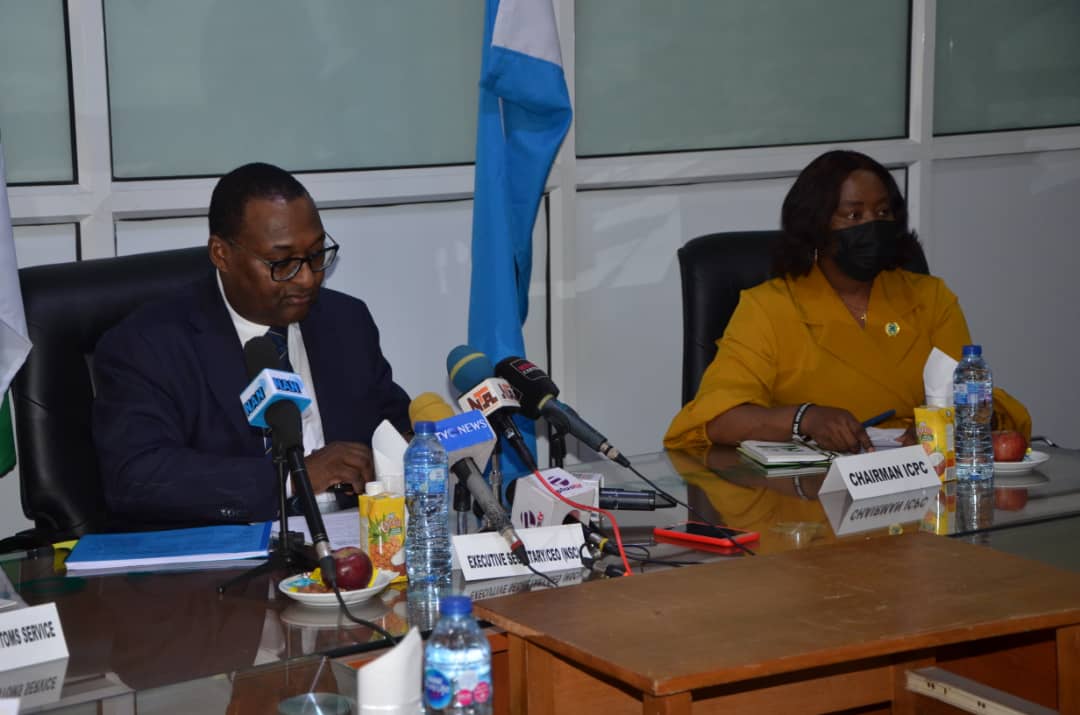The Independent Corrupt Practices and Other Related Offences Commission (ICPC) and the Nigeria Shippers’ Council have vowed to enforce the implementation of the recently launched Nigerian Port Sector Manual.
Chairman of ICPC, Professor Bolaji Owasanoye, while briefing journalists in Abuja, said the Commission will ensure the full implementation of the Manual, which provides step-by-step instructions compiled to help port users carry out routine operations in a simplified format. Prof. Owasanoye, who was represented by the Spokesperson of the Commission, Mrs. Azuka Ogugua, reiterated that there would be consequences for any government official who violated the Standard Operating Procedures at the port.
He said, “We are working with Nigeria Shippers’ Council, Nigerian Ports Authority and the Department of State Security, to fully enforce the port process manual”. The ICPC boss emphasized that when staff of all government agencies and ports stakeholders operating at the port adhere to the process manual, it would block corruption loopholes and boost the economy of Nigeria.
He further revealed that a Ports Standing Task Team made up of the collaborating agencies has been deployed at the Lagos Ports and would soon be deployed at the Port-Harcourt ports to ensure compliance with the manual, adding that the mandate of the task team included monitoring, sting operations based on intelligence, and prosecution of offenders. He stressed that the project was a collaborative one and called on all hands to be on deck to ensure a cleaner port sector.
Earlier, the Executive Secretary (ES) and Chief Executive Officer (CEO) of Nigerian Shippers’ Council, Mr. Hassan Bello, decried the lack of coordination between government agencies at the ports which, he said was fueling corruption. He said that besides the issues of obsolete equipment which made Ease of Doing Business policy of the government difficult, the physical/analogue conduct of businesses at the ports by agencies involved was costing Nigeria dearly.
He said, “We have been struggling at the ports. The ports have been riddled with too much corruption, some of the laws governing operations are not transparent, the equipment are relics and we are still doing many things manually. These fall short of the global best practices.”
He opined that the way forward for an economic viable port system was for the country to embrace full use of technology at the ports, adding that government agencies operating at the ports should conduct Joint Boarding and Joint Examinations of vessels. He further stated that Nigerian Shippers’ Council will ensure the pruning down of agencies that board vessels on arrival from nine to five, as well as ensure that the berthing time was reduced to the barest minimum.
According to him, “We want joint boarding and joint examination of vessels. It will cut down sharp practices and corruption. It should be about NIMASA, Immigration, Port Health Services and NDLEA, and not all-comers affairs anymore. The more you clear ships quickly, the more they come and that means more money for the country. The era when people walked leisurely into the ports to carry out examinations of vessels is over.” Also making contributions at the briefing, the Comptroller-General of the Nigerian Customs Service (NCS), Col. Hammed Ali (rtd.) complained that the ports have been turned into warehouses by importers.
Ali, who was represented by an Assistant Comptroller General, H. Gummi, was worried that Nigeria was fast becoming a transit destination for illicit drugs. He said the service was introducing high-end technological devices to curb all forms of illegal activities at the ports. While stating that over 4000 containers have been abandoned at the ports, thereby causing nuisance to operators, he added that NCS has bought into the joint boarding and examinations of vessels proposed by Shippers’ Council.
The Press briefing was also attended by the Nigerian Ports Authority (NPA), National Inland Waterways Authority (NIWA), Technical Unit on Governance & Anti-Corruption Reforms (TUGAR), and other stakeholders.
ICPC, Shippers’ Council to enforce Nigerian Port Process Manual


